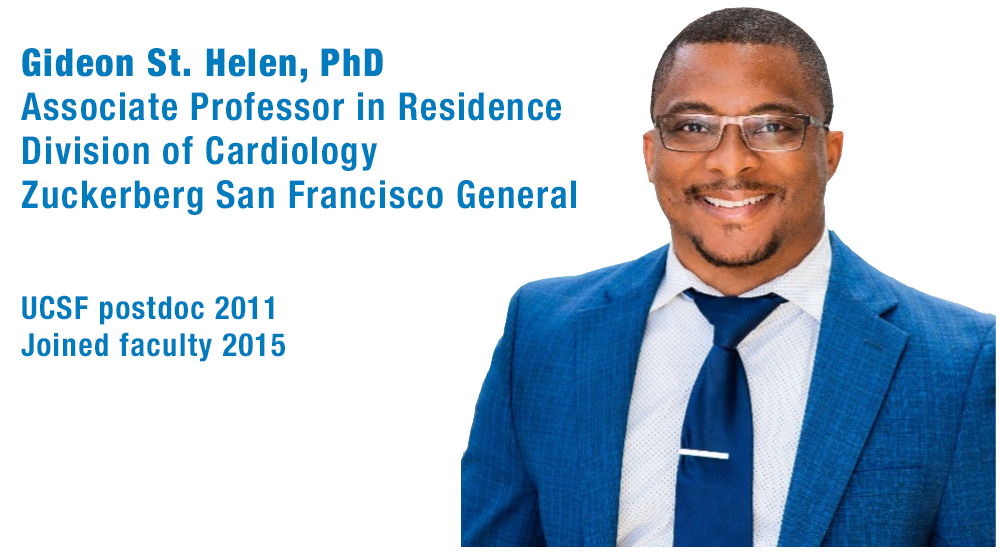Gideon St. Helen
- About me
- Why I chose UCSF
- My experience with diversity, equity, inclusion, and belonging here in the DOM
- How PRIDE Values are embodied in the DOM
About me

Why I chose UCSF
As I contemplated a postdoctoral fellowship at the Center for Tobacco Control Research and Education (CTCRE) at UCSF in 2011, I had one major trepidation: San Francisco is so far from St. Lucia, Georgia, Florida, and North Carolina! These are places where my family and loved ones live. But I knew that I would regret not taking this opportunity for the rest of my life if I let it pass.
The CTCRE is regarded nationally and internationally as the leading center of tobacco-related research, with giants in the field like Neal Benowitz, Stan Glantz, and Pam Ling. Proximity to these individuals, the opportunity to be mentored by, and potentially do research in their labs, was appealing. Further, the center’s interdisciplinary approach to education of fellows and to studying and solving the tobacco problem was a selling point. Most importantly, however, I was intrigued by the research done by the Benowitz lab, which included nicotine pharmacokinetics and toxicology of various tobacco products, understanding the biobehavioral underpinnings of tobacco-related health disparities, and tobacco-regulatory research, which was becoming more important after Congress gave the FDA the authority to regulate the manufacture, distribution, and marketing of tobacco products in 2009. I was trained in the Benowitz lab and now conduct research with similar focus as well as expanding to cannabis.
When I look back at the opportunities I have had since moving to UCSF in 2011, the national and international reach it has afforded, I am assured that this move was a wise life decision.
My experience with diversity, equity, inclusion, and belonging here in the DOM
I’m a Black man from the Caribbean Island of St. Lucia, who speaks with a distinct St. Lucian accent. My differentness is visible and audible and has largely been positive, but I have struggled with what some call “imposter syndrome” – the limiting belief that one may not be good enough to be where they are. While a postdoctoral fellow at the CTCRE, I was impressed by the diversity of the fellows and staff researchers and how much this enriched our experiences during that time. There were LGBTQ fellows and significant gender, racial, religious, and cultural diversity among us. I have never experienced such warm collegiality in an academic setting!
My limiting beliefs and feelings of not belonging were more pronounced when I became a faculty member in 2015. There is a disproportionately small number of Black men at the assistant or associate professor levels at UCSF. I knew one other Black junior male faculty member at ZSFG who left for the East Coast after my first year as faculty. I have not seen a young Black male faculty member at ZSFG since then. Earlier on, this lack of visibility of Black men at my level, even though there were several Black men in senior leadership positions at UCSF, led to questions of whether I belonged here or even have what it takes to succeed.
UCSF has been making significant efforts to improve DEI, including through the Differences Matter initiative. My own efforts include service on various committees where I reemphasize the importance of DEI. Importantly, I serve alongside Dr. Carmen Masson as multi-PI of the UCSF Learning for Early Careers in Addiction & Diversity (LEAD) Program, an NIH R25 grant focused on mentoring racially minoritized junior faculty and postdocs become independent NIH-funded investigators. That I was a scholar in this program and now MPI have been a source of satisfaction.
How PRIDE Values are embodied in the DOM
Professionalism, Respect, Integrity, Diversity and Excellence (PRIDE) are values that are embodied in every aspect of DOM operation, from patient care to student education, staff, and research. These values guide my path here at UCSF. PRIDE are values that characterize the research operation of our Research Program in Clinical Pharmacology. Dr. Neal Benowitz, who has been my mentor since my postdoctoral fellowship, has been the scientist who has best epitomized these values and has been my model. DOM continues to make significant efforts to enhance DEI, including through efforts aimed at retention of racial minoritized junior faculty. I was impressed by and appreciative of Dr. Meshell Johnson’s guidance as I went up for promotion to Associate Professor, ensuring that every requirement was satisfied.